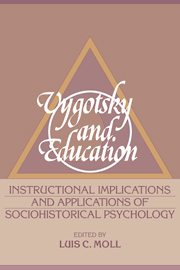Book contents
- Frontmatter
- Contents
- List of contributors
- Preface
- Acknowledgments
- Introduction
- Part I Historical and theoretical issues
- Part II Educational implications
- Part III Instructional applications
- 11 Changes in a teacher's views of interactive comprehension instruction
- 12 Learning to read and write in an inner-city setting: A longitudinal study of community change
- 13 Writing as a social process
- 14 Creating zones of possibilities: Combining social contexts for instruction
- 15 The zone of proximal development as basis for instruction
- 16 Detecting and defining science problems: A study of videomediated lessons
- 17 Assisted performance in writing instruction with learningdisabled students
- Name index
- Subject index
15 - The zone of proximal development as basis for instruction
Published online by Cambridge University Press: 05 June 2012
- Frontmatter
- Contents
- List of contributors
- Preface
- Acknowledgments
- Introduction
- Part I Historical and theoretical issues
- Part II Educational implications
- Part III Instructional applications
- 11 Changes in a teacher's views of interactive comprehension instruction
- 12 Learning to read and write in an inner-city setting: A longitudinal study of community change
- 13 Writing as a social process
- 14 Creating zones of possibilities: Combining social contexts for instruction
- 15 The zone of proximal development as basis for instruction
- 16 Detecting and defining science problems: A study of videomediated lessons
- 17 Assisted performance in writing instruction with learningdisabled students
- Name index
- Subject index
Summary
This chapter describes a teaching experiment combining psychological theory development with school teaching. The project took place in a Danish elementary school and followed the same class from third to fifth grade. Here I will report only on the activities of the first year of our experiment, which was carried out in cooperation between researcher and teacher in a social science subject (biology, history, and geography).
The aim of the project is to formulate a theory of children's personality development that considers development from a comprehensive point of view in a cultural and societal context and to formulate a related theory of instruction. We base our work on the methodology of the cultural-historical school, as formulated for Vygotsky (1985–1987) and developed by Leontiev (1978, 1981), Elkonin (1971, 1980), Davydov (1977, 1982), and Lompscher (1980, 1982, 1984, 1985).
In this chapter, I will focus on those aspects of the project that illustrate the importance of Vygotsky's concept of the zone of proximal development. I will show that, as an analytic tool for evaluation of school children's development in connection with schooling, this concept is of great value.
The theoretical basis
Vygotsky's zone of proximal development connects a general psychological perspective on child development with a pedagogical perspective on instruction. The underlying assumption behind the concept is that psychological development and instruction are socially embedded; to understand them one must analyze the surrounding society and its social relations.
Information
- Type
- Chapter
- Information
- Vygotsky and EducationInstructional Implications and Applications of Sociohistorical Psychology, pp. 349 - 371Publisher: Cambridge University PressPrint publication year: 1990
Accessibility standard: Unknown
- 52
- Cited by
